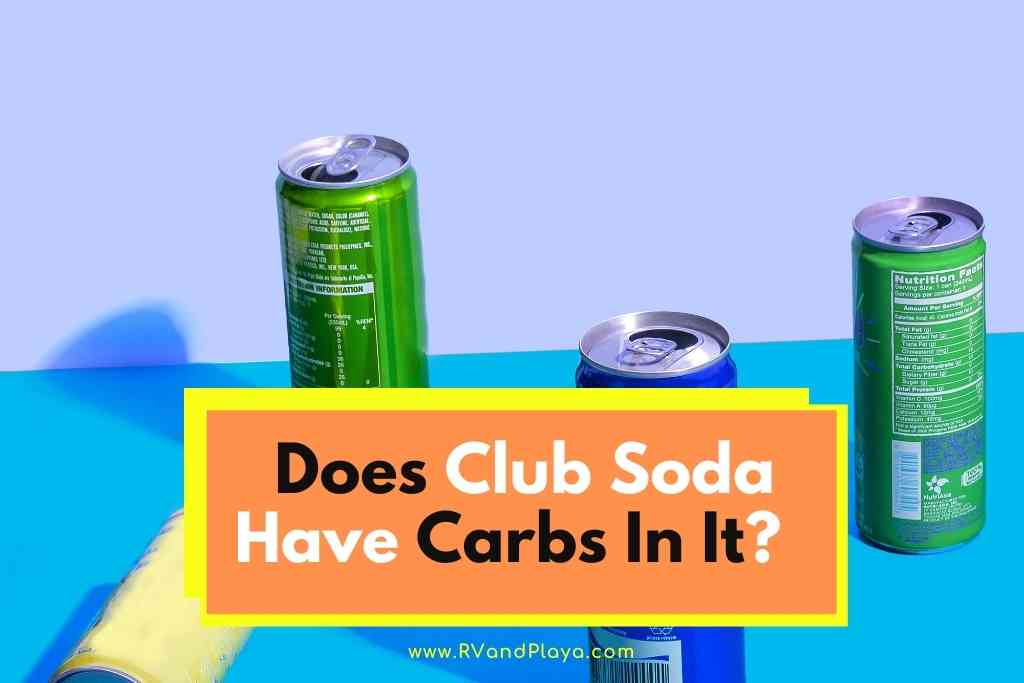Have you ever asked yourself if Club Soda has carbs in it? As the general public becomes more health-conscious, more and more people want to know exactly what’s in their food and beverages.
As the general public becomes more health conscious, more and more people want to know exactly what’s in their food and beverages. Depending on personal health or dietary needs, you may want to limit some carbohydrates (“carbs”), and beverages can be a sneaky source of carbs.
Club soda, a healthy alternative to sugary, high-calorie drinks, does not have carbs in it. For those looking for a zero-calorie, zero-sugar, zero-carbohydrate carbonated beverage, club soda and other carbonated waters are a good choice.
In this article, we’ll discover why club soda doesn’t have carbs in it, and which popular beverages are surprisingly high-carb. We’ll also help you pick low-carb beverage alternatives if you are looking to avoid carbohydrates.
Table of Contents
So, what is club soda exactly?
Before learning why club soda doesn’t have carbs in it, it’s helpful to know what it actually is. Club soda is water that has carbon dioxide and minerals added to it. The carbon dioxide carbonates it (which makes it bubbly), and the minerals neutralize any acidity in the water.
The most common minerals added to club soda are potassium bicarbonate, sodium bicarbonate, sodium citrate, potassium sulfate, and sodium chloride. These added minerals mimic the taste of natural spring water.
Read Also: Does Club Soda Have a Taste? (Same As Water? – Real FACTS!)
What are other types of carbonated water besides club soda?
There are many types of bubbly, carbonated water on the market, and it can be confusing to tell them apart. Club soda, seltzer, tonic water, and sparkling water can all seem the same, but there are subtle differences between them. What’s important to know is all the above carbonated waters are carbohydrate free, with the notable exception of tonic water.
Seltzer water (also known as soda water) is just plain water that has been carbonated with carbon dioxide. Sparkling water (also known as mineral water) has naturally occurring mineral additives, and may even have naturally occurring carbonation, depending on its source. None of these types of waters have sugar, which means they are carbohydrate free and contain no calories.
What about flavored carbonated water beverages?
Some brands of carbonated water have flavoring added to them, since the taste of club soda, seltzer, and sparkling water can be fairly neutral. If you are watching calories or carbs, check the labels of flavored waters to make sure they are still sugar-free or calorie-free.
Why is tonic water different from other carbonated water beverages?
Tonic water is an outlier of carbonated water beverages, because it does have sugar in it. This means it is the only one out of the list above that has carbs.
Tonic water is a type of seltzer that has had quinine and sugar added to it. Historically, quinine was used as a “tonic” to prevent malaria. Quinine is also notoriously bitter, so soda and sugar were added to sweeten the bitter taste, resulting in “tonic water” as we now know it.
What are carbohydrates?
Carbohydrates, or “carbs”, are macronutrients (fat and protein are the other common macronutrients) that the body uses for fuel. The body breaks down carbs into glucose. The bloodstream then absorbs the glucose and uses it throughout the body as short-term fuel to energize cellular processes.
An increase in carbs in the body will also increase blood sugar. This can be an issue for people with type 1 or type 2 diabetes, who cannot adequately manage their body’s balance of blood sugar. Blood sugar that is either too high or too low can be dangerous.
Carbohydrates can be complex or simple. Complex carbohydrates have a chemical structure that is less likely to cause blood sugar spikes. Simple carbohydrates are quickly absorbed into the body which can create a spike in blood sugar and also can contribute to weight gain.
There are three types of carbohydrates: Fiber, sugars, and starches:
Fiber
Fiber is a complex carbohydrate found in plant-based foods. There is no fiber in meat. Your body can’t break down fiber, so it passes through the digestive system unprocessed, stimulating and assisting with digestion. Fiber helps regulate blood sugar and can help you feel full longer. It is considered a healthy carbohydrate.
Sugars
Sugars are simple carbohydrates that break down quickly and are absorbed quickly into the bloodstream. Because they are absorbed so fast, sugars are notorious for causing blood sugar spikes and crashes. Sugars can occur naturally, as they do in many fresh fruits or in milk; or they can be added, as is frequently the case in processed foods and soft drinks.
A quick way to recognize sugar in an ingredient list is to look for words that end in “-ose”. Some, but not all, sugars include fructose, lactose, maltose, dextrose, and sucrose. Some natural sugars include honey, agave nectar, and molasses.
Starches
Starches are complex carbohydrates that not only supply glucose but also supply minerals and vitamins to the body. Starches take longer to break down into the bloodstream than sugars, so they also help stabilize spikes in blood sugar and help you feel full longer.
What are some drinks that don’t have carbohydrates or are low in carbohydrates?
- Water, water with lemon
Water, water with lemon, and all of the above listed carbonated water beverages do not have carbohydrates except tonic water. Tonic water does have carbs in it because it has added sugars.
- Tea and coffee
Tea and coffee will naturally have no carbs. However, most common coffee and tea additives such as sugar, milk, and cream do contain sugars, which will add carbs.
- Spirits and Wine
Spirits like vodka, tequila, rum, and whiskey have no net carbs at all. Wine is generally low in carbs, however, some sparkling wines, such as prosecco, may have sugar added.
- Diet Soft Drinks
Diet soft drinks often contain no sugar, and are zero-calorie, zero-carb. However, diet soft drinks use artificial sweeteners such as aspartame or stevia. If you are having trouble staying away from sweet foods, the artificial, intense sweetness in diet sodas can make it harder to kick the habit.
Read Also: Does Club Soda Have Caffeine (Top Secret!)
What are some drinks that are high in carbs?
- Milk and milk-based drinks (including lattes, smoothies, and milkshakes)
All milk beverages derived from animal milk contain lactose, which is a type of sugar carbohydrate. Even soy milk contains carbs, with slightly more carbs per 1 cup serving than cow’s milk. Milk drinks containing added sugars and sweeteners will be even higher in net carbs.
- Fruit juice and fruit smoothies
All fruit juices contain carbs, either occurring naturally in sugars and fiber or added after juicing. Some types of juice will have less carbs than others. If reducing carb intake is your goal, choose juices that naturally offer less carbs, drink a smaller serving, and opt for fresh juice if possible. Smoothies have a higher amount of carbs than juice because they usually have milk, honey, or other high-carb ingredients.
- Alcoholic drinks (beer, mixed drinks, and cocktails)
While not all alcoholic drinks contain carbs, beer, cocktails, and mixed drinks do. If watching carb content, be aware of mixers added to alcoholic drinks as well as the alcohol itself. While seltzer added to a vodka drink will have zero net carbs, adding creamer to vodka will most definitely create a high-carb cocktail.
Here are some of my favorite services, products, and Stores
There are affiliate links, so if you do decide to use any of them, I´ll earn a small commission. But in all honesty, these are the exact what I use and recommend to everyone, even my own family.
To see all my of most up-to-date recommendations, check out this resource that I made for you!
+ Products & Services
+ Convenience Stores
+ Save Thousands of Dollars
References
https://my.clevelandclinic.org/health/articles/15416-carbohydrates
https://www.dietdoctor.com/low-carb/drinks
Recent Posts
Do you know if Club Soda has an expiration date or is club soda good after the expiration date? these are the questions our readers ask a lot. Well, we´ve got you covered. You crack open a can of...
Do you know if Club Soda can hydrate you? this is one of the questions our readers ask a lot. Well, we´ve got you covered. Staying hydrated is one of the most important things we can do for our...


